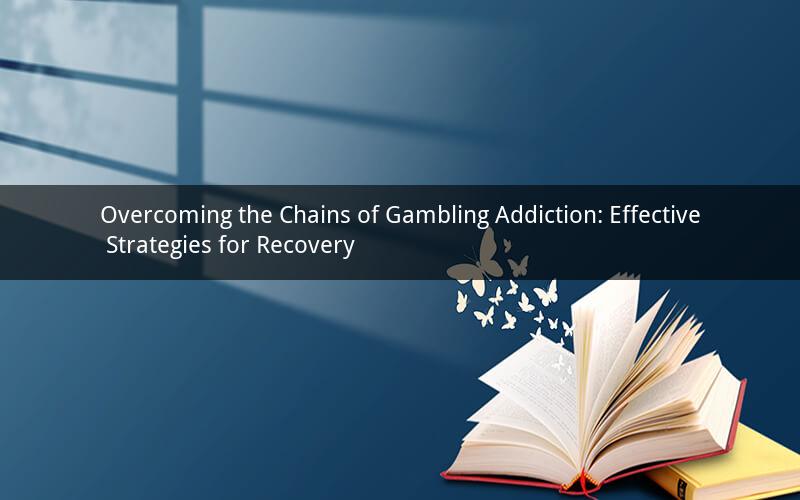
Gambling addiction is a serious condition that can lead to severe financial, emotional, and social problems. It's important to recognize the signs of addiction and take immediate action to overcome it. In this article, we will discuss various methods to remove gambling addiction and provide insights into a successful recovery journey.
1. Seek Professional Help
If you or someone you know is struggling with gambling addiction, it's crucial to seek professional help. Therapists and counselors who specialize in addiction can offer personalized treatment plans and support throughout the recovery process. Cognitive-behavioral therapy (CBT) is a highly effective approach that can help you change harmful thought patterns and develop healthier behaviors.
2. Understand the Roots of Your Addiction
Understanding the underlying reasons for your gambling addiction is essential for overcoming it. Many factors can contribute to the development of an addiction, including stress, financial difficulties, and social influences. By addressing these root causes, you can minimize the chances of relapse.
3. Create a Support System
Surrounding yourself with a strong support system is vital during your recovery journey. Friends, family, and support groups can offer emotional support and guidance. Joining a support group like Gamblers Anonymous can provide you with a sense of community and shared experiences with others who are facing similar challenges.
4. Develop Healthy Coping Mechanisms
Identifying and adopting healthy coping mechanisms is crucial for overcoming gambling addiction. Instead of turning to gambling as an escape from negative emotions, find healthier ways to deal with stress, boredom, or anxiety. Engaging in activities such as exercise, meditation, and hobbies can help you stay focused on your recovery and maintain a balanced lifestyle.
5. Set Realistic Goals
Setting realistic goals is an important step in your recovery journey. Start by setting small, achievable goals and gradually progress to larger goals as you become more confident in your abilities. Celebrate your achievements along the way, no matter how small they may seem, as this will help you stay motivated.
6. Avoid Triggering Situations
Identify situations, places, or people that may trigger your gambling addiction and try to avoid them. This might include visiting casinos, engaging in online gambling, or spending time with individuals who encourage your addictive behavior. By staying away from these triggers, you can minimize the chances of relapse.
7. Establish Financial Boundaries
Financial issues often accompany gambling addiction, so it's essential to establish and maintain financial boundaries. Set a budget for your expenses, and avoid using credit cards or loans to fund your gambling habits. Consider seeking financial counseling to help you regain control of your finances and reduce the stress associated with debt.
8. Monitor Your Progress
Regularly monitor your progress to ensure that you're on the right track. Keep a journal to track your thoughts, feelings, and behaviors, and make adjustments to your recovery plan as needed. Remember that overcoming gambling addiction is a lifelong process, and it's normal to face challenges along the way.
9. Be Patient with Yourself
Healing from gambling addiction takes time and patience. Be kind to yourself throughout the process and understand that setbacks are a normal part of recovery. Avoid becoming discouraged by temporary setbacks, and instead focus on your progress and the steps you're taking to overcome your addiction.
10. Stay Committed to Your Recovery
Finally, staying committed to your recovery is crucial for long-term success. Remain dedicated to your treatment plan, continue seeking support from your support system, and be persistent in your efforts to overcome gambling addiction.
Q1: How can I recognize the signs of gambling addiction in myself or someone I know?
A1: Look for signs such as increased financial problems, secrecy, neglect of responsibilities, preoccupation with gambling, and lying about gambling activities. If you or someone you know is exhibiting these signs, it's important to seek help immediately.
Q2: What is cognitive-behavioral therapy (CBT) and how can it help me overcome gambling addiction?
A2: Cognitive-behavioral therapy is a type of therapy that helps you identify and change negative thought patterns and behaviors. CBT can help you develop healthier coping mechanisms, manage stress, and reduce the urge to gamble.
Q3: Are there any natural remedies or supplements that can help me overcome gambling addiction?
A3: While there are no proven natural remedies or supplements for gambling addiction, maintaining a healthy lifestyle can contribute to your overall well-being and make it easier to overcome your addiction. This includes getting regular exercise, eating a balanced diet, and ensuring adequate sleep.
Q4: How can I prevent a relapse once I've overcome my gambling addiction?
A4: To prevent a relapse, continue to engage in healthy coping mechanisms, maintain a strong support system, and stay committed to your recovery plan. Avoid triggering situations, set realistic goals, and be patient with yourself throughout the process.
Q5: What resources are available for those struggling with gambling addiction?
A5: Various resources are available for individuals struggling with gambling addiction, including therapists and counselors, support groups like Gamblers Anonymous, financial counseling services, and helplines that provide guidance and support. Research local resources or visit online platforms to find the right support for your needs.